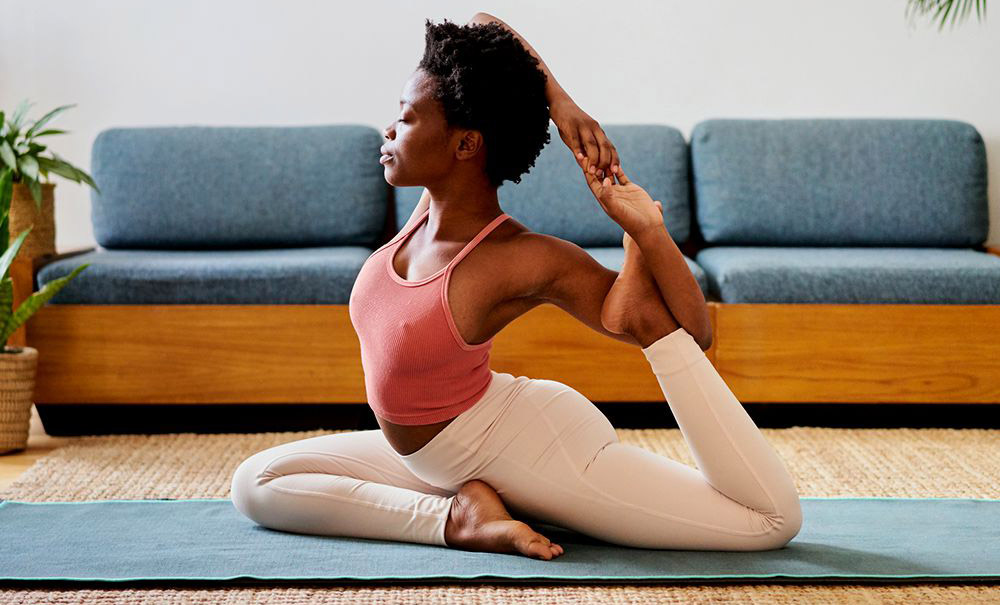Yoga has many health benefits, ranging from improving flexibility to strengthening muscles and reducing stress. It also promotes better sleep and mood.
In a recent study, researchers found that practicing yoga increases the secretion of melatonin, which helps regulate your sleeping pattern. In addition, it reduces PTSD symptoms and improves mental sharpness.
Improved Flexibility
The stretching in yoga improves flexibility and lubricates joints, helping you to move more freely. It also helps your body improve balance, which is essential for maintaining mobility as you age.
Yoga can also help prevent injuries, whether you’re a athlete or not. The improved posture and internal awareness that yoga promotes can help you to avoid injury by being more mindful of your movements. This preventative approach can make a big difference for athletes who are prone to injuries in their competitive pursuits or even just during everyday activities.
The slow movements and deep breathing in yoga can also improve respiratory function, helping people with chronic health conditions like asthma. In addition, researchers have found that yoga can help reduce chronic inflammation in the body. A 2019 study reported that those who practiced yoga for a longer period of time had lower blood levels of inflammatory biomarkers compared to those who did not. (Djalilova, 2019).
Strengthened Muscles
Many of the postures in yoga require you to support your own weight, which strengthens muscles in new ways. Poses that build upper-body strength include downward dog, plank and chaturanga (four-legged pose). Athletes often add yoga to their regular workout routines to help prevent injuries from muscle imbalances or overuse.
Yoga also helps reduce chronic inflammation in the body, which can reduce your risk for a variety of diseases. A 2019 review found that people who practice yoga regularly show a decrease in the amount of inflammatory markers in their blood.
Practicing yoga can also increase your body awareness. This will allow you to notice any areas of tightness or discomfort before they become injured. This is why yoga is so good for preventing injuries in athletes. It can also be used as a warm-up before other exercises by slowing movements and increasing your breathing. It can even help you recover faster after exercise. Several studies show that yoga can increase recovery rates by improving the body’s ability to handle stress.
Improved Balance
In yoga, you learn to be in the present moment, and that improves your balance. This can help you prevent injuries and perform better during physical activities. For example, poor posture and muscle imbalances can lead to hamstring and hip injuries, while a lack of coordination can result in rotator cuff issues and carpal tunnel. Yoga can help you correct these problems with posture and movement techniques.
It also helps to improve your overall body awareness and coordination. This is important for all sports and physical activities, but it’s especially crucial during intense workouts. Yoga requires you to move your body in different positions, and it also encourages deep breathing.
While yoga isn’t as aerobic as running or biking, it can still be a good cardiovascular workout and can make your heart stronger. It can also strengthen your muscles and help you maintain flexibility.
Reduced Stress
Yoga can help reduce stress because it provides a healthy way to release built up tension and frustration. The quiet, precise movements and emphasis on being in the moment can also help to calm the mind and provide a sense of mental clarity and well-being.
In addition, the physical activity of yoga helps to strengthen bones and muscles, which can improve overall health and relieve pain in some conditions. For example, research has shown that yoga can ease the pain and stiffness of rheumatoid arthritis and increase flexibility and range of motion. It can also help improve energy levels and reduce fatigue in people living with multiple sclerosis.
Yoga may also help people with depression, anxiety and other psychiatric disorders by improving their mood and providing an opportunity to socialize with others. However, the lack of high quality RCTs and consistent measurement of outcomes limits these promising results (Brinsley, 2020). Further research is needed to establish standardized protocols tailored for specific psychiatric conditions and incorporate yoga into more comprehensive treatment programs.


